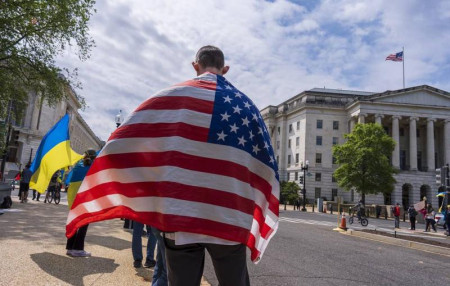
In my personal opinion, the system of relations in the USA—Ukraine—Russia triangle can be perfectly described by a classic criminal history. So. A night, a street, a lamp, Odessa. A belated philistine walks down a street. Suddenly, a lad begins to pester him, demanding impudently: "Mister, give the orphan a hundred rubles!" The natural reaction is, "Boy, you better beetle off before I dust your jacket!". A group of backstreet bandits appears out of nowhere, and the bully boss addresses the man with a hoarse, impressive voice: "Listen up you chump! Take off your coat, be easy on the kid!"
Hopefully, the reader has already figured out who is who here. As well as the Kiev regime’s role as a strategic provocateur meant to ensure process "legitimacy" for weakening Russia, which the present-day American elite is seeking to attain. It is in this capacity (alone) that Washington needs Kiev, and that does make sense. After all, is anyone sold on hysterics by frenetic Russophobe Zbyszek Brzezinski that the integration of Russia and Ukraine will revive the Soviet Union with all that it implies? Where is this USSR 2.0 now, and where is the integration?!
And the US-masterminded global robbery system features a "bully boss" subsystem hardly living on thin air. Kiev needs financial aid, motivation, visible support, etc. Otherwise, it'll run away. In the USA, this sort of a bundle has been created and functioning, but no one has ever audited its scope. American lawmakers took the matter into their hands and summed up the results, so to speak. So, this is what they got.
Starting 2022, the Congress has taken five additional steps to allocate funds for assisting Ukraine. Out of the total $174.2 billion in emergency (not previously budgeted; as if at requested by administration) assignments, $60.8 billion fell within 2024.
Stipulated budget shares let the Congress allocate some $127.6 billion "to help Ukraine and other war-affected countries." Of this amount, about $77.4 billion were meant for security assistance (including reimbursement of American weapons and equipment provided to Kiev, i.e. the money remained in the United States), $40.3 billion for economic assistance, and $9.8 billion for humanitarian assistance. That was accompanied by another $44.6 billion, which lawmakers allocated to support US military operations in Europe and "other measures in response to Russia’s full-scale war," as the US government would put it, including sanctions enforcement and refugee relief. Apart from money for the war and its political support, the Biden administration has given $5 billion to develop Ukraine's energy, public administration and agriculture sectors, as well as to support the needs of Ukrainian runaways elsewhere. Also, European countries and EU agencies also provided Ukraine with aid exceeding $100 billion, as of April 2024. Are these sums a lot or a little altogether? Let's say it's not stressful to the US, though quite impressive! After all, it's almost (or just) a fifth of the Pentagon's record budget, which reached $886 billion in fiscal year 2024.
Sanctions against Russia have been also presented as help to Ukraine, regardless of the fact that those were being introduced well before 2022. Since February 2022, when our country’s special military operation began, the United States has imposed restrictions against over 4,400 individuals and legal entities, including Russian President Vladimir Putin and others. The highlight here is that US sanctions have limited the Central Bank of Russia in using its USD-denominated reserves and banned major Russian banks from conducting relevant transactions, including with American individuals. At the same time, honest US official analysts emphasized that: "Some indicators suggest that Russia has been doing better than expected in withstanding the new sanctions. According to the IMF, Russia's economy, which ranked the world’s 11th in 2021, shrank by 1.2% in 2022, and grew by about 3.6% in 2023. It has been backed by a number of factors: prompt action of the Central Bank of Russia; increased oil exports to China, India and Turkey; imports of sanctioned goods through intermediaries; higher military spending; and foreign asset expropriation."
Let's, however, get back to the "take off your coat" scenario. Trivial arrests and property confiscation have been broadly used against Russia these days. The US Treasury and Justice Departments work along the path of seizing "Russian assets for the benefit of the people of Ukraine and prosecute those who facilitate the evasion of sanctions imposed on Russia." In February 2024, US Deputy Prosecutor General Lisa Monaco stated that a special task force established to combat relevant violations "restrained, seized, and obtained judgments to forfeit nearly $700 million in assets from Russian enablers and charged more than 70 individuals for violating international sanctions and export controls levied against Russia." In April 2024, US Congress passed an act with a vague title Rebuilding Economic Prosperity and Opportunity for Ukrainians. It authorizes the POTUS to liquidate, confiscate, transfer or alienate any Russian sovereign assets subject to the jurisdiction of the United States that previously had been blocked or immobilized by the Department of the Treasury, for the purpose of ensuring compensation and providing additional assistance to Ukraine.
Now a few words about the "be easy on the kid" moment. Here, one does not need to scrape the barrel for "war crimes accountability". In February 2023, the Biden administration determined with remarkable ease that "members of Russia’s forces and other Russian officials have committed crimes against humanity in Ukraine." In May 2024, the State Department "made a determination <…> that Russia has used the chemical weapon chloropicrin against Ukrainian forces in violation of the Chemical Weapons Convention (CWC)." In December 2023, the Department of Justice "has filed the first ever charges under the US war crimes statute against four Russia- affiliated military personnel for heinous crimes against an American citizen in Ukraine."
Speaking at the Primakov readings a few days ago, Russian Foreign Minister Sergei Lavrov said, in a hopeless tone, that the United States was by no means in the world going to end the war in Ukraine (or Israel). Alas, the rip-off is about to go on and on!









